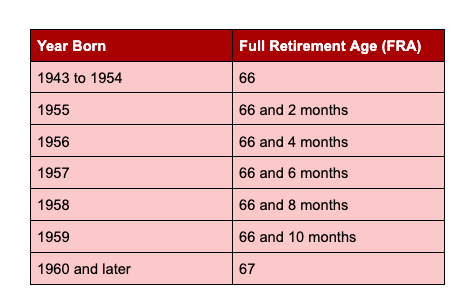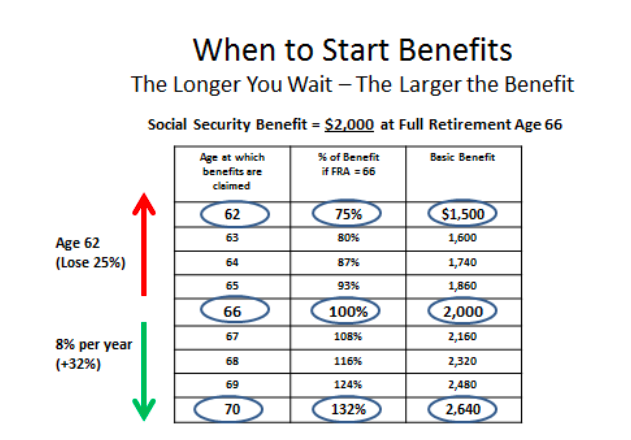
Your 2023 Social Security Benefits Guide
Louis J. Butera, CFP® | January 05, 2023
If you find yourself nearing retirement, it’s likely you may be experiencing a range of emotions. We understand that the transition to this new phase of life can be overwhelming and confusing, but you can rest assured that with the right guidance, you can make the most of your Social Security benefits.
In the following guide, we’ll provide you the information you need to understand the Social Security process in order to help increase your benefits. We’ll cover topics such as how Social Security works, when and how to apply, and strategies to boost your benefits. We’ll guide you to avoid costly mistakes while providing you with tools to stay up to date on any changes to Social Security.
With record numbers of retirees expected as the baby boomer generation collectively reaches age 65, it’s vital that you fully understand how this process works. Our goal is to help you gain the confidence and knowledge needed to make the most of your benefits. With this comprehensive guide, you’ll have the information you need to navigate the process, make the right decisions, and enjoy a relaxed and comfortable retirement.
How Are Social Security Benefits Calculated?
Your Social Security benefits are calculated by the Social Security Administration (SSA). Benefits are based on lifetime earnings across your 35 highest earning years. You must work a minimum of 10 years to be eligible for benefits. If you have worked less than 35 years, your earnings will be calculated with zeros for the years you have not worked. All past wages are indexed to today’s wages in order to accurately reflect wage growth.
Once your average monthly earnings for your top 35 years are calculated, a special formula is applied and the result is your primary insurance amount (PIA). The PIA is the benefit you are eligible to receive when you reach full retirement age (FRA).
The actual benefit you receive may not be your PIA. This is because your PIA will be increased or decreased depending on when you choose to receive benefits. Taking benefits before FRA will reduce your benefit, and waiting until after FRA will increase your monthly benefit. Also, starting at age 62, your eligible benefits will receive regular cost-of-living adjustments (COLA).
Spousal Benefits
Married people are eligible for benefits based on their spouse’s work history. The spousal benefit is 50% of the working spouse’s earned benefit. In order to receive these benefits, the working spouse must be at least 62 and have already filed for benefits.
If you are divorced, you may also be eligible to receive spousal benefits based on your ex-spouse’s work history. Your marriage needs to have lasted at least 10 years, you must be divorced for at least two years, and you must still be single. In addition, you need to be at least 62 and not eligible for a higher benefit amount based on your own work record. Unlike spousal benefits for married people, your ex-spouse does not need to have filed for benefits in order for you to claim them.
When Can You Claim Social Security Benefits?
You can claim your Social Security benefits anytime between age 62 and age 70. If you continue to delay taking benefits after you reach age 70, there is no additional benefit increase. However, the age at which you choose to collect benefits before 70 will impact the amount of benefit you receive.
Early Retirement
You can start receiving benefits as early as 62, but your monthly benefit will be lower than if you waited longer. Your basic benefit is reduced a fraction of a percent for each month you begin receiving benefits prior to full retirement age. Retiring early can permanently reduce your benefit by up to 30%.
Full Retirement Age
Your full retirement age (FRA) changes based on the year you were born. FRA is 66 for those born between 1943 and 1954 and increases by two months for every year after that you were born until it settles at age 67 for those born in 1960 or later. If you wait until you reach full retirement age to begin collecting your Social Security benefits, you will receive the full PIA that you have earned.

Delayed Benefits
If you’re still working or don’t need the money immediately, you can delay receiving your benefits. Your benefit will increase by 8% for each year that you delay, with a maximum possible increase of 32%. You cannot delay and increase your benefit indefinitely, though. Once you reach age 70, the amount of benefits you receive will not increase any further.
When Is the Best Time to Claim Social Security Benefits?
While you are working, you can increase your future Social Security benefits by earning higher wages. Once you stop working, though, the only influence you have over your benefit is when you begin to take it. Your timing has a great impact on the amount of the benefit you will receive and should be carefully considered.
Social Security Statement
An important document that you will reference during the decision-making process is your Social Security statement. The Social Security Administration mails statements to workers age 60 and over who aren’t receiving Social Security benefits and do not yet have a my Social Security account. These statements will be mailed out three months prior to your birthday, but you can also access the same information by setting up an account on their website.
The statement will tell you your:
- Estimated benefit if taken at age 62
- Estimated benefit if taken at FRA
- Estimated benefit if taken at age 70
- Estimated disability benefit
- Estimated family and survivor benefits
- Medicare information
- Earnings history
All benefit amounts listed are estimates and subject to change. They are calculated based on your date of birth and future estimated taxable earnings.
It is important to review your earnings history and check for accuracy. Your benefit is calculated based on those numbers, so any mistakes can affect your benefits. You should correct any errors as soon as possible.
Deciding When to Claim Benefits
Your Social Security benefits are calculated using complex actuarial equations based on life expectancy and estimated rates of return. They are not designed to encourage early or late retirement. If you live as long as anticipated, the total amount you receive over your lifetime should be about the same whether you claim it at age 62, age 70, or sometime in between. You will either receive the money as a smaller monthly payment over a longer period of time or a larger monthly payment over a shorter period of time.
The best time for you to claim your benefits depends on your personal situation and health. If you expect to live longer than average, your overall lifetime benefit will be greater if you delay claiming your benefits to increase your benefit amount. If the opposite is true and you see little chance of making it into your mid-80s, you would likely receive a greater lifetime benefit by taking it sooner, even though it would be a smaller monthly payment.

This is a hypothetical example and is not representative of any specific situation. Your results may vary.
Once you decide when you want to start receiving benefits, remember to complete your application three months before the month in which you want your retirement benefits to begin.
How Can Married Couples Maximize Benefits?
Because married people have the ability to receive their own benefit or a spousal benefit, they have more to consider when filing for benefits. With the right strategy, married couples can maximize their benefits.
In the majority of cases, the lower-earning spouse may want to begin collecting benefits early while the higher-earning spouse waits as long as possible. That way, you can access the lesser benefit while maximizing the higher benefit.
Consider a situation where the husband has a higher benefit and the wife has a lower one. On average, women tend to live longer than men. By following this strategy of waiting as long as possible to claim the higher benefit, you not only maximize the husband’s retirement benefit for use while he is alive, but it also maximizes the wife’s survivor benefit when he passes away.
Restricted Application
While it used to be a popular claiming strategy, the Restricted Application is now only available to those born before January 2, 1954. By restricting your application, you can receive a spousal benefit if your spouse is already collecting benefits while allowing your own benefit to continue to grow until age 70. That way, you can begin to receive spousal benefits while maximizing your own benefit.
How Does Working Affect Benefits?
Working does not affect your benefits once you reach FRA, but it does before that. Only earned income, such as wages and self-employment earnings, affects your Social Security benefits. Income from investments, pensions, and annuities do not affect Social Security benefits.
When you are under FRA for the whole year, your Social Security benefit is reduced by $1 for every $2 you earn over $21,240. In the year that you reach FRA, your benefit is reduced by $1 for every $3 you earn over $56,520. Once you reach FRA, your benefit is no longer reduced no matter how much you earn. These dollar amounts adjust each year, so your benefit may change in following years.
2023 Cost-of-Living Adjustment
In 2023 the COLA is 8.7%, which is the biggest increase in 40 years. With this change, Social Security benefits are expected to increase by more than $140 per month starting in January 2023. There is also an increase in the Social Security tax cap. The cap is increased from $147,000 to $160,200, meaning Social Security taxes will not be withheld from income earned above that amount.
This substantial increase in benefits will hopefully provide retirees some relief from the rising cost of goods and services. Historically, a COLA that fails to keep pace with inflation only serves to exacerbate financial hardships. It’s important to keep in mind that the COLA will affect pre-retirees and retirees differently. Here’s what to expect based on where you are in your retirement journey.
Retirees Taking Social Security
While this increase is good news for retirees, it’s not a license to change spending habits all that much—as most retirees know all too well.
It will still be necessary to keep track of your finances, spending—and, importantly, your tax liabilities; some beneficiaries could experience increased taxes in the coming years, depending on their thresholds.
Retirees Not Taking Social Security
Retirees who have not started claiming Social Security will still reap the benefits of this increase even if they don’t take Social Security this year. There is never a decrease in the COLA, so the higher payments are here to stay. Keep in mind that, in some cases, it’s worth holding off taking Social Security for several years once you’re eligible as discussed above. Of course, the benefits of doing so vary based on individual circumstances.
Connect With a Qualified Professional
Making the right decisions about Social Security can be a daunting task, but you don’t have to do it alone.
At Butera Wealth Management, we understand the complexity of Social Security and can provide the professional guidance you need to make the best decisions for your financial future. Our experienced advisors can help you understand your eligibility, calculate your risk tolerance and benefits, and determine exactly when and how to claim them.
We’re here to help you reach your retirement goals and make the most of Social Security. Schedule a free, no-obligation phone call by contacting us at 484-455-2661 or louis@buterawm.com to learn how our 2nd Opinion Service can make a difference in your financial life.
About Louis
Louis Butera is the founder and president of Butera Wealth Management, LLC, an independent wealth management firm operating out of Newton Square, Pennsylvania. With over 30 years of experience in the financial services industry, Louis specializes in serving pre-retirees who hold management or executive roles, particularly in the pharmaceutical industry. In 2015, he started his own firm with the express goal and vision of fostering meaningful relationships with clients to help them pursue financial independence and prepare for retirement. Louis and the Butera team provide a customized process to help their clients plan for every aspect of their financial life. Trust has always been key for Louis, and with this foundation, he has helped guide his clients through many different market cycles and life milestones.
Louis is a CERTIFIED FINANCIAL PLANNER™ professional and has a bachelor’s degree in business management from Ithaca College. When he’s not working with his clients, Louis enjoys being outside, playing golf, skiing, and leading an active life with his wife, Michelle. They are both great supporters of local charities and their community. To learn more about Louis, connect with him on LinkedIn.
Disclaimer
The LPL Financial registered representative(s) associated with this website may discuss and/or transact business only with residents of the states in which they are properly registered or licensed. No offers may be made or accepted from any resident of any other state.
Content in this material is for general information only and not intended to provide specific advice or recommendations for any individual. To determine which strategies or investments may be suitable for you, consult the appropriate qualified professional prior to making a decision.
This material was prepared for Louis Butera’s use.

